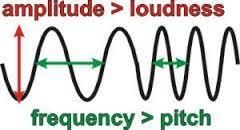Class 9 Exam > Class 9 Notes > Year 9 Physics (Cambridge) > Sound
Sound | Year 9 Physics (Cambridge) - Class 9 PDF Download
Loudness and Pitch
Loudness
- Loudness refers to the intensity or volume of a sound.
- It is measured in decibels (dB).
- Examples:
- A rock concert produces a loud sound.
- A whisper produces a soft sound.
Pitch
- Pitch refers to how high or low a sound is perceived.
- It depends on the frequency of the sound wave.
- Examples:
- A flute produces a high-pitched sound.
- A drum produces a low-pitched sound.

Interference
Types of Interference
- Constructive Interference: Occurs when two or more waves combine to produce a wave with a larger amplitude.
- Examples: When two sound waves with similar frequencies reinforce each other.
- Destructive Interference: Occurs when two or more waves combine to produce a wave with a smaller amplitude.
- Examples: Noise-cancelling headphones use destructive interference to reduce unwanted sounds.
Summary
Sound involves characteristics such as loudness and pitch, which determine how we perceive sound waves. Loudness is the intensity of sound, measured in decibels, while pitch depends on the frequency of the wave. Interference describes how waves interact with each other, either reinforcing (constructive interference) or canceling out (destructive interference) each other's amplitudes. Understanding these concepts helps in explaining various everyday sounds and technological applications like noise reduction techniques.
Question for SoundTry yourself: Which type of interference occurs when two or more waves combine to produce a wave with a larger amplitude?View Solution
The document Sound | Year 9 Physics (Cambridge) - Class 9 is a part of the Class 9 Course Year 9 Physics (Cambridge).
All you need of Class 9 at this link: Class 9
|
9 videos|20 docs|4 tests
|
FAQs on Sound - Year 9 Physics (Cambridge) - Class 9
| 1. What are the main characteristics of sound waves? |  |
Ans. Sound waves are characterized by their frequency, amplitude, and wavelength. Frequency refers to the number of cycles per second, amplitude is the height of the wave, and wavelength is the distance between two consecutive points in a wave.
| 2. How does interference affect sound waves? |  |
Ans. Interference occurs when two or more sound waves overlap, causing them to either reinforce each other (constructive interference) or cancel each other out (destructive interference). This can result in changes to the overall sound quality.
| 3. What are some examples of interference in sound waves? |  |
Ans. Examples of interference in sound waves include echoes, noise cancellation technology, and the phenomenon of beats in music. These examples demonstrate how interference can either enhance or diminish the clarity of sound.
| 4. How do sound characteristics impact the quality of sound in different environments? |  |
Ans. The characteristics of sound waves, such as frequency and amplitude, can affect how sound travels and is perceived in different environments. For example, high frequencies may be better suited for open spaces, while low frequencies may be more suitable for enclosed areas.
| 5. How can understanding sound characteristics help in improving sound quality in educational settings? |  |
Ans. Understanding sound characteristics can help in designing classrooms with proper acoustics, utilizing sound technology effectively for presentations, and implementing noise reduction strategies to create an optimal learning environment for students.
Related Searches





















